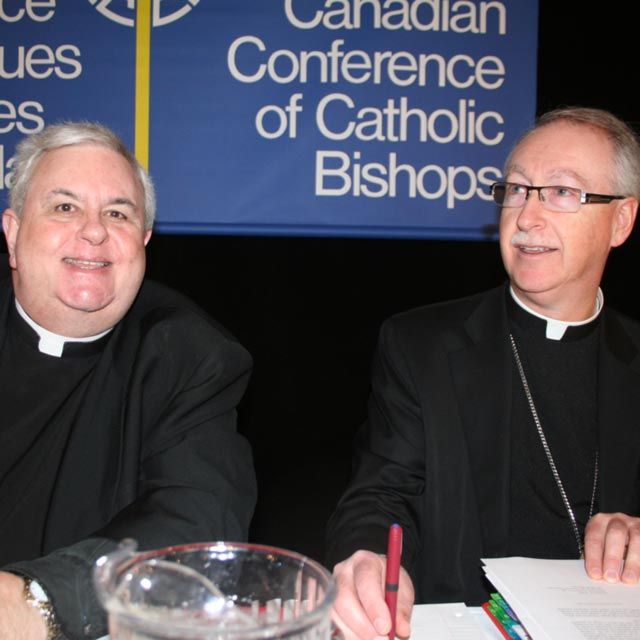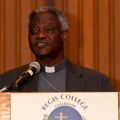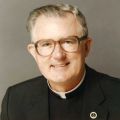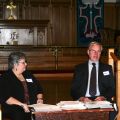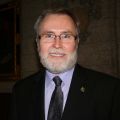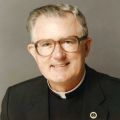Development and Peace, bishops continue close collaboration
By Deborah Gyapong, Canadian Catholic NewsOTTAWA - During the annual plenary of the Canadian Conference of Catholic Bishops (CCCB) in Ste. Adele, Que., Sept. 24-28, the bishops reaffirmed their ongoing collaboration with their overseas development agency, both respecting its lay-run character and ensuring its Catholic identity.
The lay-run character of the Canadian Catholic Organization for Development and Peace came under fire in recent weeks when its fall education campaign was put on hold after several bishops objected to the campaign for being too political, as first reported in The Catholic Register. The National Post and its sister papers picked up on the story Sept. 26.
The stories saying the bishops intervened, blocked or stopped the fall program are inaccurate, said CCCB president Archbishop Richard Smith in a post-plenary interview from Edmonton Oct. 1.
“The most important thing to emphasize is the bishops are working with D&P on their fall campaign,” said Smith.
The bishops support the principle of D&P’s annual fall educational campaign which raises consciousness about the needs in the developing world “to make people aware of the plight but also the reasons behind it,” he said.
D&P can embark on education programs, but when the strategy includes working through the parishes in local dioceses, “nothing should be taking place without the consent of the local bishop,” he said.
This year’s fall campaign departed from D&P’s plan of focusing on environmental themes to raising questions about Canada’s international aid policies, following substantial reductions in CIDA grants over the next five years. The agency, founded by the bishops more than 40 years ago, was “formulating a campaign as part of a broader movement of development agencies,” Smith said.
“Some of the material was becoming a little more direct political lobbying than we’re accustomed to,” Smith said. Some bishops, Smith included, expressed concern the materials might cause divisiveness in parishes and among donors.
The bishops must ensure “whatever’s done fosters the unity of the Church and is in no way divisive,” he said.
Smith said he spoke to the leadership of D&P about the concerns, which they received graciously, openly and with a “readiness to understand.”
D&P’s leadership “gave some thought to the impact on the life of the Church” of their campaign and told the bishops they would “adjust their literature to reflect their concerns.”
The bishops also heard a report from Toronto Auxiliary Bishop John Boissonneau, from the Liaison Committee composed of D&P leadership and the CCCB’s Standing Committee on Development and Peace, about the progress of documents outlining the principles guiding D&P’s relationship with its overseas partners, contracts with partners, the integration of Pope Benedict XVI’s social justice encyclical Caritas in Veritate into the agency’s work and the training of its staff.
Smith said the documents are “close to final draft stage” and “are still being reviewed.”
In other plenary news, the bishops approved next year’s budget and saw nothing unusual in the present financial pictures of the conference. There will be no hike this year in the per capita rates charged dioceses based on the numbers of Catholics living there.
The bishops also had an off-the-record meeting with Immigration Minister Jason Kenney and that went well, Smith said.
“The conversation was very respectful, open and very frank... It was a welcome opportunity to speak to the minister as a voice for the voiceless,” Smith said. “He certainly did hear us.”
The bishops also marked the upcoming 50th anniversary of the opening of the Second Vatican Council. Smith spoke of how Pope Benedict XVI in his emphasis on the Year of Faith is the clearest voice calling for people to read and understand the documents of the Second Vatican Council so the new evangelization can be based on the beauty of the Catholic faith articulated in them.
Abortion pushed on Third World may have racist agenda, says Cardinal Turkson
By Deborah Gyapong, Canadian Catholic NewsOTTAWA - Programs pushing contraception and abortion on the developing world under the guise of women's health care and "reproductive rights" may have an underlying racist agenda, Cardinal Peter Turkson said in a Sept. 28 interview.
"The program being pushed does not reflect the true situation of women in the Third World," the president of the Pontifical Council for Justice and Peace said. "It derives from a certain thinking that you deal with poverty by eliminating the poor."
Some think poverty has to do with demographics, that because populations are so high they cannot feed themselves so stopping population growth is the key to ending poverty, Turkson said.
"I can think of nothing more fallacious than that," said Turkson, who was in Ottawa for a conference at Saint Paul University on the Second Vatican Council.
"Since when did abortion become a health issue?" he asked, though he noted some argue that without proper access women will "seek it through the back door."
If people are serious about women's health care there are many more things needed than abortion and contraception, he said.
"Why not ask the Africans what they need? Why not ask the Asians what they need for women's health?" he said.
"It's not for people sitting here (in the West) to decide the issues for people in developing world are abortion and contraception. These are not health issues."
The cardinal said he has met people from various ministries in Europe who "think this is the thing to do."
"There will be a racist agenda behind all of this," he said, noting the population control efforts are focused on Africa and Asia.
He used his own life growing up in Ghana as an example of why population control is not the answer to reducing poverty. Neither his father nor mother ever went to school. His father worked as a carpenter; his mother traded vegetables in the market.
"You can think of the income of such a family and yet they took care of 10 of us," he said.
All his siblings completed secondary school; one brother got into the technology field and works in Toronto; another worked for the United Nations in Denmark.
"What it requires is good will on the part of the parents and sacrifice," he said. "It doesn't require sterilization or abortion."
He noted some children of poor families "invariably grow up to pull others out of poverty."
Turkson stressed the Church's social doctrine cannot be separated from concern for unborn life and warned against Catholic development agencies getting involved in the push for abortion or contraception through the guise of improving women's lives in the development world.
When it comes to Catholic groups working under the Caritas Internationalis federation, "we cannot have a group that is Church-based which is at variance with Church teaching," he said.
"We have to move from this schizoid experience of believing one thing and doing another. Our faith should inspire what we do."
People donate to Caritas groups because they see images of famished people or children who need an education, he said. If for any reason agencies collect money that goes to another purpose or ends up some other place that violates the principle of following the giver's intention.
Turkson stressed the inseparability of spreading the Gospel from justice and peace, as well as the inseparability of respect for unborn life from the Church's social doctrine.
Pro-life forces rally around Motion 408 condemning sex selection abortions
By Deborah Gyapong, Canadian Catholic NewsOTTAWA (CCN) — On Sept. 26, as Motion 312 went down to defeat in the House of Commons, another Tory MP introduced a motion condemning sex selection abortion that continues the building momentum in the pro-life movement.
Conservative MP Mark Warawa quietly introduced Motion 408 just before the vote on fellow Tory MP Stephen Woodworth’s Motion 312, knowing it would become public the next day. It already has the support of pro-life groups.
Motion 408 reads: “That the House condemn discrimination against females occurring through sex-selective pregnancy termination.”
Warawa said he began crafting the motion after seeing a CBC investigative report June 12 that used hidden cameras to expose private ultrasound clinics that reveal the sex of unborn children. Most of the time, when the parents found out the unborn child was a girl, they would seek to terminate the pregnancy because they wanted a boy, Warawa said in an interview from his Langley, B.C. riding Sept. 28.
“This is a problem around the world,” he said. “It should not be happening.”
Warawa called the practice “blatant discrimination against females and should not be tolerated.”
“Gender discrimination should not be happening at any time, of any kind,” he said, noting the CBC report “triggered Canadian outrage because people were ending the pregnancy simply because the baby was a girl.”
On June 13, all the national parties came out with statements condemning the practice of sex selection pregnancy termination, as did the Society of Society of Obstetricians and Gynecologists of Canada, he said. Around the same time Environics conducted a poll showing 92 per cent of Canadians thought it should be illegal,
he said.
Warawa had a number of MPs in his office shortly after the program all saying the practice should be condemned, so he went to work to craft language that addresses the issue but will be acceptable to every national political party, he said.
“It’s very simple, and the focus of the motion is quite narrow, to condemn the practice of gender selection in Canada,” he said.
Canada is going to be one of the first countries to launch the Year of the Girl next month, celebrating women and girls, he said. He
hopes to get unanimous consent for his motion from all the national political parties so his motion can be passed by the time the Year of the Girl is launched
in October.
If any parties refuse to give unanimous consent, his motion will come for its first hour of debate in March 2013 about six months from now, he said.
Campaign Life Coalition has launched a petition in support of Motion 408, that calls sex selection abortion is “a reprehensible practice that targets baby girls for female gendercide and represents discrimination against women in its most extreme form.”
“Justice starts in the womb,” said Catholic Life and Family director Michele Boulva in an email interview. “If we can't protect females from discrimination before birth, how can we expect justice and equality for women after birth?”
Boulva also called attention to the 96 per cent of unborn children with Down’s syndrome who are being aborted.
“As Christians, we know that God wants and loves every human being who is conceived. We are called to care for all and to love each other as Christ has loved us,” she said.
Second opinion saves rural parish from getting the shaft
By Lorraine WilliamsKEARNEY, Ont. - Everyone’s heard of seeking a second opinion for medical issues, but it turns out it can also be good for the health of a parish.
St. Patrick’s parish in Ontario’s cottage country did exactly that and today they are celebrating the completion of a restoration project that had seemed a distant dream not so long ago.
Built by Irish lumbermen in 1904, St. Patrick’s is a heritage-designated church that, engineers had said, required $700,000 worth of repairs in order to re-open after being closed for five years. The parish has just 25 permanent families and “swells” to 39 families in summer. A fund-raising drive under Fr. John Albao started strong but slowed down well short of its ambitious target.
According to one parishioner, “Fr. Albao went out every day for two years praying at the church’s outdoor Marian shrine for assistance.”
His prayers were answered one day at Holy Spirit Church in nearby Burks Falls where he met a parishioner named Brian Peever, the owner of a masonry business.
“We got to talking and he told me he had a special feel for St. Patrick’s,” Albao said.
When Peever heard about the stalled restoration project he offered to get another estimate from an engineering colleague. That estimate came in at just $89,500 for the major structural work. Other improvements required an additional $60,000, so the original project cost of $700,000 was reduced to about $150,000.
Buoyed by this unexpected news, the parish fundraising drive was invigorated and enough money was found to repair the beams, posts, pillars and exterior masonry. Toronto’s Portuguese community had already covered the $20,000 cost for a new roof. So the church was recently re-opened.
Peever has long ties to St. Patrick’s.
“My wife and I were married there,” he said. “My son was baptized there. My father-in-law is buried there and I plan to be buried there.”
When asked if he had given the church a special rate for the work, Peever replied, “No, it was an honest quote. It was what I would have given to anyone for similar work.”
With the major work complete, all that’s left is finishing a wheelchair ramp and reinforcing the steps to the choir loft.
“The response of our regular and summer visitors has been so generous,” Albao. “It is not me who has done this. It is the loyal parishioners.”
Canadian voice sought to bring Congo peace
By Michael Swan, The Catholic RegisterTORONTO - With a death toll estimated at 5.4 million and climbing and a campaign of rape reshaping the nation, Congolese religious leaders arrived in Canada with a petition signed by more than one million Congolese and a request that Canadians support practical measures for peace at the United Nations.
“You have a voice and your voice is strong to stop this war. You have the means to stop this war. And you have a way,” Bishop Ntambo Nkulu Ntanda of the United Methodist Church in the Democratic Republic of Congo told The Catholic Register.
The bishop was part of a delegation that visited the Toronto School of Theology at the University of Toronto in mid-September. The delegation was at the university to speak to students about the effects of the war after meeting earlier in Ottawa with Canadian government officials.
The war in the Congo has officially been over since the Sun City Agreement installed a government of national unity under President Joseph Kabila in 2003, but in the eastern provinces militias and government troops continue to battle for control over lucrative mines. The most notorious of the militias, the M23 Movement, has had the quiet backing of the Rwandan government and finds refuge across the border.
In June United Nations High Commissioner for Human Rights Navi Pillay called M23 leaders “among the worst perpetrators of human rights violations in the Congo, or in the world.” Human Rights Watch reports that since June M23 fighters have deliberately killed at least 15 civilians. They have also raped at least 46 women and girls — the youngest just eight years old. They killed a 25-year-old pregnant woman because she resisted and two other women died from wounds inflicted by their rapists, the organization says.
While the UN has one of its largest peacekeeping missions stationed in the Democratic Republic of Congo, the troops lack basic equipment and the mandate is so weak it would be better to describe them as an observer mission, said Prof. Raymond Mutombo.
“We do not specifically ask Canada to reinforce the UN mission with troops as such,” said Mutombo. “But the request we’ve placed is to support our petition to the United Nations.”
The petition asks for a more robust peacekeeping mandate for troops.
“Canada certainly could do it,” said John Seibert, executive director of Project Ploughshares, a Kitchener, Ont.-based ecumenical think tank dedicated to peace and defence issues supported by the Canadian Council of Churches.
Canada wouldn’t have to dedicate large numbers of troops to the Congo to make a difference, Seibert said. Canada’s French-speaking officer corps, tactics, heavy transport equipment and communications equipment would give the UN mission a huge advantage over rebel groups that employ drugged-up child soldiers with AK-47 automatic rifles.
“Look at the equipment and experience gained in the Afghanistan mission — highly mobile, tough as nails, people who know how to interact with cultural difference,” said Seibert.
Getting the international community to condemn Rwanda has been a tough sell, said Mutombo.
“From 1994 when the genocide took place in Rwanda, the international community has been taken hostage,” he said.
Guilt over the international community’s inaction during the Rwandan genocide prevents criticism of its government.
“(Rwandan President) Paul Kagame is still held in some esteem because of his stopping the genocide and bringing stability to Rwanda,” said Seibert. “That does not give him a get-out-of-jail-free card on activities in the DRC.”
Much of the fighting is over control of coltan, or more formally columbite-tantalite, an essential ingredient in the capacitors at the heart of cellphones, tablet computers, hearing aids, pacemakers and other products. As of 2009, 44.3 per cent of the world’s coltan originated in the Congo, compared to just 3.7 per cent in Canada.
Research In Motion, the Canadian company whose Blackberry phones constitute about 10 per cent of the world’s smartphones, has a “responsible minerals policy” and a “supplier code of conduct” to ensure it does not use conflict minerals in its phones. But corrupt businesses in Rwanda working with M23 rebels are able to disguise the origins of coltan they sell on the international market, according to the Congolese Church leaders.
“Coltan is just a mineral. Human life is more than a mineral,” said Ntanda. “Human life is being destroyed for no reason. People are being killed for no reason.”
The Canadian Catholic Organization for Development and Peace said it hears the same demands for international intervention to stop the violence from its partners in the Congo, said program officer Serge Blais. Development and Peace works extensively with the Congo’s Catholic bishops on projects that encourage people to engage in the democratic process.
Friends and colleagues mourn the passing of Fr. Carl Matthews
By Evan Boudreau, The Catholic RegisterCatholic education, the Jesuit community and the Church suffered a great loss on Sept. 26 with the passing of Fr. Carl Matthews.
"It was the significant end to an era," said Ottawa Archbishop Terrence Prendergast, a Jesuit himself who'd known Fr. Matthews for 50 years. "I saw him in August and noticed how frail he was but he was quite upbeat. He always had a positive attitude."
Fr. Matthews, 80, died peacefully at Rouge Valley Hospital in Ajax, Ont. Since retiring from parish life in 2010, he had lived at the Rene Goupil Jesuit Infirmary where his health deteriorated.
"He would probably thought it quite fitting that he died on the Feast of the Canadian Martyrs; that was an important devotion for him," said Prendergast. "He went very quickly at the end. People were expecting him to hang on for another week or two but the Lord called him home on that feast day."
Fr. Matthews, ordained on June 4, 1966, played many roles within the Catholic community. He was a priest, publisher of The Catholic Register for three years and served for 14 years as a trustee and then chair of the Metropolitan Separate School Board, the precursor of the Toronto Catholic District School Board. He made his most lasting mark in education, where he was an instrumental figure in establishing full funding for Ontario Catholic schools.
"I would say that he was in love with Catholic education and was a brilliant and dogged defender of our Catholic schools and our right to full funding," said historian Michael Power, author of the 2005 biography Jesuit in the Legislative Gallery: A life of Father Carl Matthews, S.J. "He learned a lot from his father who was a school inspector, but he was essentially self taught in the matter of school finances. He engineered the clinching deal on full funding."
Fr. Matthews' involvement in the funding debate began when Cardinal Gerald Emmett Carter returned from Rome in 1979 following his elevation to cardinal by Pope John Paul II. Carter, archbishop of Toronto, pulled Fr. Matthews aside and told him that the one thing he hoped to accomplish as a cardinal was to secure full publicly funded Catholic education in Ontario.
Carter asked Fr. Matthews to draft a brief but compelling argument to present to the government on the matter.
"So he left the room and within three weeks had a 12-page memorandum written," said Power. "He never heard another thing about it until in 1984 he got a call from the Cardinal's office saying listen, the premier has phoned the Cardinal asking for another copy of that memorandum. Shortly thereafter the big announcement was made."
Prior to the 1984 announcement, the province only provided subsidies up to grade 10 for Catholic schools, leaving students in grades 11, 12 and 13 to pay tuition costs.
Born in Kingston, Ont. Fr. Mattews attended his hometown's Regiopolis College before entering St. Stanislaus Novitiate in Guelph, Ont. in 1951. After first vows and two years of Juniorate, he went on to Regis College in Toronto. Fr. Matthews returned to his former high school and taught for two years before returning to the University of Toronto to formally study education — a life-long vocation of the late father.
Although he will be remembered for his tireless dedication to his many areas of commitment, one pastime took Fr. Matthews mind off everything else — baseball.
"He loved going to the Blue Jays (but) never treated himself to a half-decent seat," said Power, who attended many games with Fr. Matthews after they first met in the early '90s. "We always sat up in the 500 section and I'd say why are you sitting up here? I came all the way from Welland to sit up in the sky?
"So the last game we went to I had four very good tickets, courtesy of a friend of mine, so we sat behind the Blue Jays' dugout. He just marveled."
Power described Fr. Matthews as a true priest, a good man and genuinely humble human being. He drove a small car, had a modest apartment and always gave what he could to those in need.
"He did splurge for his TV, he subscribed to Rogers Sportsnet or whatever it is that carries the Blue Jays games," said Power. "For him that was almost a mortal sin, but I said listen, you like baseball, watch the games."
Fr. Matthews was a lot of things to a lot of people. To Power he was a boss, a man of God and most of all a friend.
"What I'll miss is just Carl, I don't know how else to say it," said Power. "The bond of true friendship is never broken, death cannot break that, but there is a loss. He's not here, he won't be phoning me anymore, he won't be writing me anymore. I will miss him."
Church Council on Justice and Corrections making a difference for 40 years
By Erin Morawetz, The Catholic RegisterOTTAWA - At the 40th anniversary of the Church Council on Justice and Corrections (CCJC), a message rang out loud and clear: “CCJC, the mission, the motto, the vision, serves as a shining light for restorative practices in justice and in corrections,” said Rev. Dr. Pierre Allard.
Allard, professor of restorative justice at Queen’s University’s school of religion in Kingston, Ont., was the keynote speaker at the anniversary celebration on Sept. 27, an evening spent looking back at past achievements and forward toward a bright future for CCJC, a multi-denominational, faith-based organization.
CCJC was founded in September 1972. It formed as a coalition of multiple Christian groups, including the Canadian Conference of Catholic Bishops, the United Church of Canada and the Anglican Church of Canada.
Over the last 40 years, the council has been an active voice lobbying for a more community based, restorative process of justice that welcomes ex-inmates back into society. It opposed the death penalty in the 1980s, and more recently, the tough-on-crime Bill C-10.
A recent landmark project for the council is “Circles of Support and Accountability” (CoSA), a five-year program funded in large part by the federal government.
Jill Bench, CoSA’s current national project manager, said the program helps former inmates, including sex offenders, find housing and employment, but its main purpose is to provide them with friendship.
“Nobody wants them back into the community,” she said. “It’s difficult enough. We provide support, we provide friendship.”
The program has met with great success since its implementation in 2009, with research showing a reduction in re-offending rates by up to 80 per cent for male participants.
Still, Nancy Steeves, the council's incoming president, said she worries about how much government funding the project — and CCJC in general — will have in the near future, with so many budget cuts.
Bench, however, is hopeful the government will see the benefit of programs like CoSA, and continue with even more consistent funding.
“I’m hoping … the evaluation (will) show that the concept of CoSA makes a difference,” she said.
And making a difference was certainly the theme of the evening.
Outgoing president Laurent Champagne, whose two-year term ended at the board’s annual general meeting the same night, said members should continue to stress the importance of restorative justice.
“I hope that we will continue not only surviving, but be a light — be a light for all these people who don’t really understand what the justice system is, what reintegration is, what restorative justice means, because they just believe in vengeance,” he said. “They are not seeing the people — the man, the woman — behind the crime.”
He urged of his fellow board members, “Be spokespeople for us in your place, in your community.”
(Morawetz is a freelance writer in Ottawa.)
MP introduces motion condemning sex-selective abortion
By Catholic Register StaffOTTAWA - MP Mark Warawa is seeking the support of his colleagues in the House of Commons in condemning sex-selective abortion.
"Recent studies have shown that the practice of aborting females in favour of males in happening in Canada," said Warawa, adding that polls show more than 90 per cent of Canadians believe the practice should be illegal.
Motion 408 is in response to numerous inquiries and concerns his office received after the CBC presented an investigation on gender selection last June. With hidden cameras, the CBC visited 22 private ultrasound clinics in Canada. They found that most of these clinics allowed ultrasounds to tell the sex of the baby so that the parents could choose to terminate the pregnancy if the unborn child was a female.
Unequivocal condemnation from Parliament will send a strong message that will help to bring an end to this form of gender discrimination in Canada, said Warawa.
Warawa introduced Motion 408 on the heels of the defeat of fellow Conservative MP Stephen Woodworth's Motion 312. Woodworth was trying to foster a debate about when human life actually begins. His motion was defeated Sept. 26.
The motion has already garnered the support of the Catholic Civil Rights League of Canada.
"In light of the defeat of Motion 312, it's encouraging to see a new private member's motion aimed directly at condemning abortions performed for gender selection," said Joanne McGarry, league president, in a statement. "The league supports this motion and will be following it closely."
Celebrate! closes its doors
By Ramon Gonzalez, Canadian Catholic NewsAfter more than five decades providing high-quality pastoral and liturgical resources to Catholic parishes and people in ministry, Celebrate! magazine is shutting down due to increasing publication costs.
Novalis Publishing says the challenge of increasing costs prevented the magazine from breaking even financially.
While readers and organizations did much to sustain its life, Novalis decided to close the publication with the Fall 2012 issue. Readers can continue to access the magazine’s content at www.celebrate-liturgy.ca until Dec. 31.
Originally known as Homiletic Service, the magazine was launched in 1961 on the eve of the Second Vatican Council.
“We are deeply saddened to see the end of this excellent publication which gave so much to Catholics deeply engaged in the daily life of their Church,” said Joseph Sinasac, publishing director of Novalis. “Yet we remain committed to developing an online alternative for serving all those involved in the life of the Church.”
Sinasac also praised the work of its Edmonton-based editor Bernadette Gasslein for raising the journalistic standards to a high level over her 21 years at the helm.
“Under Bernadette’s passionate leadership, the magazine won from the Catholic Press Association and the Canadian Church Press dozens of awards for both its content and presentation,” he said.
In spite of having lost her job as editor, Gasslein is not idle. Currently she is assisting her husband Gordon Andreiuk, an Edmonton lawyer, and is doing some writing for an American publisher and for The Prairie Messenger.
“So I’m not really out of a job,” she said. “I also have a book coming out with Novalis in early spring.” The book, which she described as an imprint of Living with Christ, is a small 32-page book called Living with the Prayers of the Mass.
Celebrate! began in 1961 and was designed to offer homilists the new scholarship that was emerging. In 1988, when the name was changed to Celebrate! the focus broadened to include material for formation for all liturgical ministers and catechists. It was described as “a magazine for catechists, religion teachers, homilists and liturgy planners.”
The magazine has always been addressed to a “niche audience” in the sense that it is designed for ordained and lay ministers, said Gasslein.
“That is by nature a relatively small audience, and it is also a difficult audience to contact because lay ministers, unless they are on staff at parishes, change frequently.”
At last count, Celebrate! had a circulation of around 5,000.
Regular features in the magazine include material on children’s spirituality, ministry to youth and young adults, Christian initiation, formation for Eucharist, the connection between liturgy and social justice, catechesis and music ministry, and a special section designed for Catholic teachers.
Motion 312 defeated, but wins support of 10 cabinet ministers
By Deborah Gyapong, Canadian Catholic NewsOTTAWA - The defeat of Conservative MP Stephen Woodworth's Motion 312 Sept. 26 was expected, but the level of support, including that of 10 cabinet ministers, came as a welcome surprise to pro-life groups and political journalists.
Defeated 203 to 91, Motion 312 was supported by 87 Conservatives, a majority of the 163-member Tory caucus, as well as four of 35 Liberal MPs.
The Conservative MP's Motion 312 would have set up a parliamentary committee to examine the 400-year-old definition of when human life begins.
Immigration Minister Jason Kenney, a devout Catholic, was the first cabinet minister to publicly announce he would support the motion. The votes of the other cabinet ministers were not anticipated however. It garnered the support of Status of Women Minister Rona Ambrose, Government House leader Peter Van Loan, National Revenue Minister Gail Shea, Trade Minister Ed Fast, Intergovernmental Affairs Minister Peter Penashue, International Co-operation and CIDA Minister Julian Fantino, Agriculture Minister Gerry Ritz, Foreign Affairs Secretary of State Diane Ablonczy and Minister of State for Seniors Alice Wong.
Prime Minister Stephen Harper respected the House tradition of free votes on private member's business, something the New Democratic Party was not prepared to do, said Woodworth at a news conference following the vote.
"NDP members, with their extreme personal preoccupation with abortion, actually suggested that we give the Prime Minister power to veto private members' motions," he said. "Can you imagine. They propose to take away one of the most effective democratic tools left to MPs in the face of an MP's diminishing role."
Woodworth said he'd done his job by exposing Subsection 223(1), "the most vile, most unjust law in Canada." It rules that a human life does not begin until a baby is actually born.
Though opponents of Motion 312 have said the abortion debate is settled and the courts recognize a right to abortion, Woodworth pointed out Justice Bertha Wilson in the 1988 Morgentaler decision left the question of protection for unborn life to Parliament. That means the question of how to honour universal human rights in Canada "will remain open and unresolved," he said.
"This issue was never closed, it's not closed now and will never be closed if we in Parliament continue to stick our collective head in the sand," he said.
He remarked on the huge volume of mail mostly in favour of the motion, the hundreds of petitions with thousands of signatures that showed both women and men supported it. The volume of mail was so big it clogged up the Parliamentary post office, he said.
"I want Canadians to remember that no great issue is ever determined by a single vote in the House of Commons," he said. "It remains for the Canadian people to rise up even more strongly in defence of honest laws and universal human rights, which are so shamefully violated by subsection 223(1)."
"I think Canadians will conclude that much of what was said by those speaking against Motion 312 in the Parliamentary debate lacked any logic or coherence," he said. "Many speakers against Motion 312 showed they were willing to abandon time-honoured Canadian values in a single-minded personal preoccupation with abortion no matter how grave the consequences."
Campaign Life Coalition national organizer Mary Ellen Douglas congratulated the MPs who had the courage to vote for the motion.
"We hope this will give them the courage to continue to bring up the issue in Parliament as often as it takes to obtain a law," she said.
She said all of the identified pro-life MPs except for a couple were accounted for in the vote. But many others not identified as pro-life also supported it.
"The point is they were presumably voting on freedom of speech," she said, noting "pro-aborts" have said the issue "cannot even be discussed in Parliament."
"Although the motion was defeated, it was very encouraging to see the subject brought forward, as well as the groundswell of support through meetings with MPs, e-mails, letters, phone calls and petitions," said Catholic Civil Rights League executive director Joanne McGarry.
"We thank Mr. Woodworth for proposing the motion, and all those MPs who supported it and thereby kept respect for life on Canada's agenda," McGarry said in a statement. "This particular motion has been defeated, but the debate on this issue, which many Canadians believe is anything but 'settled,' will continue until Canadian law recognizes the humanity of the unborn."
WeNeedaLAW.ca represents a grassroots campaign to bring about federal restrictions on abortion. Its director, Mike Schouten, defended Ambrose against an attack by Abortion Rights Coalition of Canada spokeswoman Joyce Arthur who accused the minister of throwing "women under the bus" and described her vote as a "slap in the face to the women of Canada."
"The Abortion Rights Coalition of Canada is a group of extremists who advocate for abortion on demand through all nine months of pregnancy," said Schouten in a Sept. 27 release. "Not only does Ms. Arthur continually misinterpret the Supreme Court decision in 1988, she also advocates for the legality of late-term and sex-selective abortions."
Former Register publisher Fr. Carl Matthews passes away
By Catholic Register StaffArticle has been amended for updated information on Fr. Carl Matthews' wake
TORONTO - Fr. Carl Matthews, S.J., a former publisher and editor of The Catholic Register, died Sept. 26. The 80-year-old Fr. Matthews was in his 62nd year of Jesuit life.
Fr. Matthews died peacefully at Rouge Valley Hospital in Ajax, Ont. He had been at the Rene Goupil Jesuit Infirmary as his health deteriorated since his retirement from parish life in 2010.
It is Fr. Matthews' dedication to Catholic education where he made his name. He served for 14 years as a trustee with the Metropolitan Separate School Board, the predecessor of the Toronto Catholic District School Board, and is among those most responsible for full funding being extended to Catholic schools. Along with the late Cardinal Gerald Emmett Carter, Fr. Matthews worked tirelessly in the halls of Queen's Park to bring equal funding to Catholic high schools, which up until 1984 were only fully funded up until Grade 10.
In the early 1990s, Fr. Matthews was publisher and editor of The Catholic Register before returning to parish life. He spent 16 years, from 1994-2010, as pastor of St. John the Evangelist parish in Waubaushene, Ont., on the shores of Georgian Bay in the northern reaches of the archdiocese of Toronto.
Born in Kingston, Ont., in 1932, Carl Joseph Damien Matthews attended Regiopolis College in his hometown before entering St. Stanislaus Novitiate in Guelph, Ont., in 1951. After first vows and two years of Juniorate, he went on to Regis College in Toronto. He returned to Regiopolis to teach for two years before returning to the University of Toronto to study education.
Fr. Matthews was ordained a priest June 4, 1966. He served in a number of parishes in the archdiocese, including Martyrs' Shrine in Midland, Ont., Good Shepherd parish in Thornhill and St. Michael's Cathedral.
A wake will be held for Fr. Matthews on September 30th from 2-4 p.m. (service at 3 p.m.) at Manresa Retreat House in Pickering, Ont., and from 7-9 p.m. at Rosar Morrison Funeral Home, 467 Sherbourne St. in Toronto. The funeral will be held at 10:30 a.m. on October 1st at Our Lady of Lourdes Church, 520 Sherbourne St. Burial is at the Jesuit Cemetery in Guelph.

